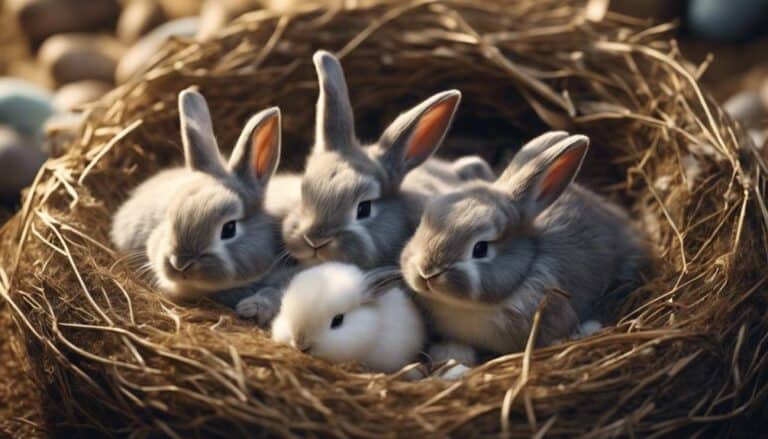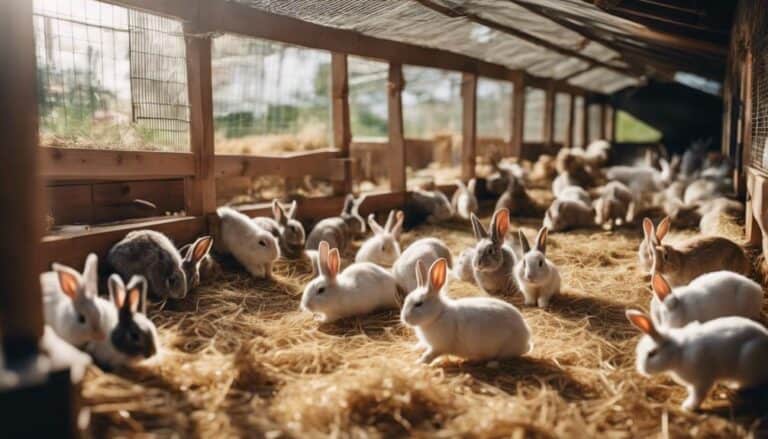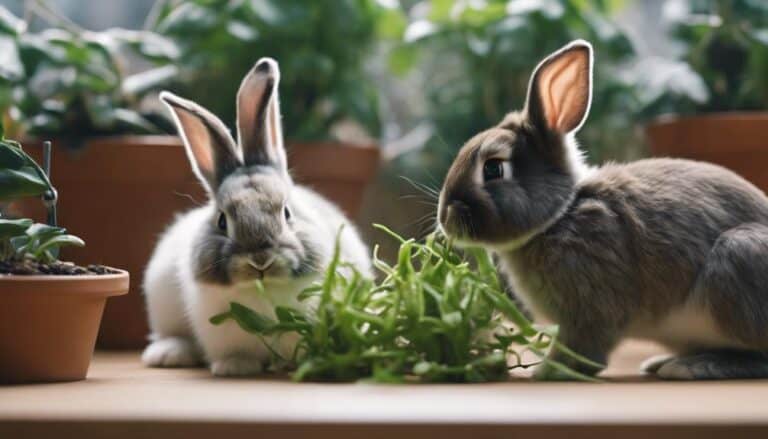Have you ever wondered if the length of a bunny's pregnancy is truly as short as some say?
Understanding the intricacies of a rabbit's gestation period can shed light on the mystery surrounding these adorable creatures.
Exploring the duration of bunny pregnancies opens up a world of fascinating facts that can help you better care for your furry friends.
Curious to uncover the secrets behind this aspect of rabbit reproduction?
Contents
Key Takeaways
- Understanding the 31-day gestation period aids in managing rabbit breeding cycles effectively.
- Nesting behaviors like fur pulling and increased appetite signal rabbit pregnancy.
- Providing a quiet, clean nesting area and a balanced diet is crucial for pregnant rabbit care.
- High-fiber diet, fresh hay, and consistent water supply support pregnant rabbits' health during gestation.
Bunny Gestation Period Duration
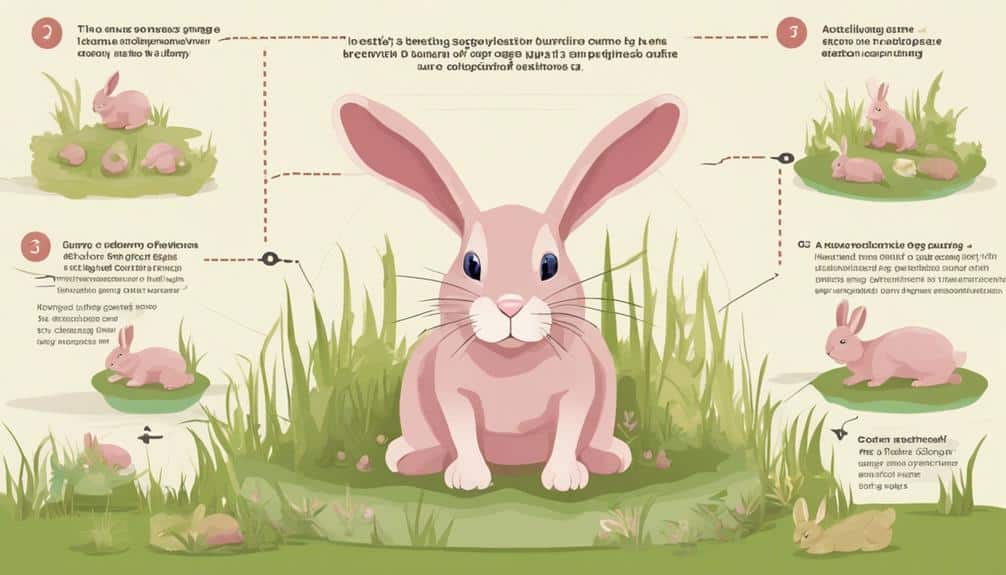
When caring for rabbits, understanding the duration of the bunny gestation period is essential for proper breeding management. Bunnies have a relatively short gestation period, typically lasting around 31 days, although it can range from 28 to 33 days. This short gestation period is an important trait of female rabbits compared to many other mammals. Due to this brief timeframe, rabbits undergo frequent breeding cycles, making it important for those involved in rabbit care to manage their breeding practices effectively.
Managing rabbit pregnancies requires a keen eye on timing and preparation. Being aware of the bunny gestation period allows for better planning and care for the mother rabbit and her offspring. With this knowledge, you can anticipate when the babies will arrive, ensuring that the mother has a comfortable and safe space to give birth. Understanding the duration of the bunny gestation period isn't only beneficial for breeding purposes but also plays a significant role in the overall well-being of the rabbits in your care.
Signs of Bunny Pregnancy
Recognizing signs of bunny pregnancy involves observing behaviors that can indicate the presence of developing offspring in female rabbits. To determine if your rabbit might be pregnant, look out for the following signs:
- Nesting Behaviors: If you notice your rabbit pulling fur to create a nest or rearranging bedding in a secluded area, this nesting behavior could be a sign of pregnancy.
- Increased Appetite: A pregnant rabbit may show a noticeable increase in appetite and water intake as her body demands more nutrients to support the growing babies.
- Territorial Behavior: Female rabbits can become more territorial and aggressive towards males when they're pregnant, as they seek to protect their nesting area and potential offspring.
Caring for Pregnant Bunnies
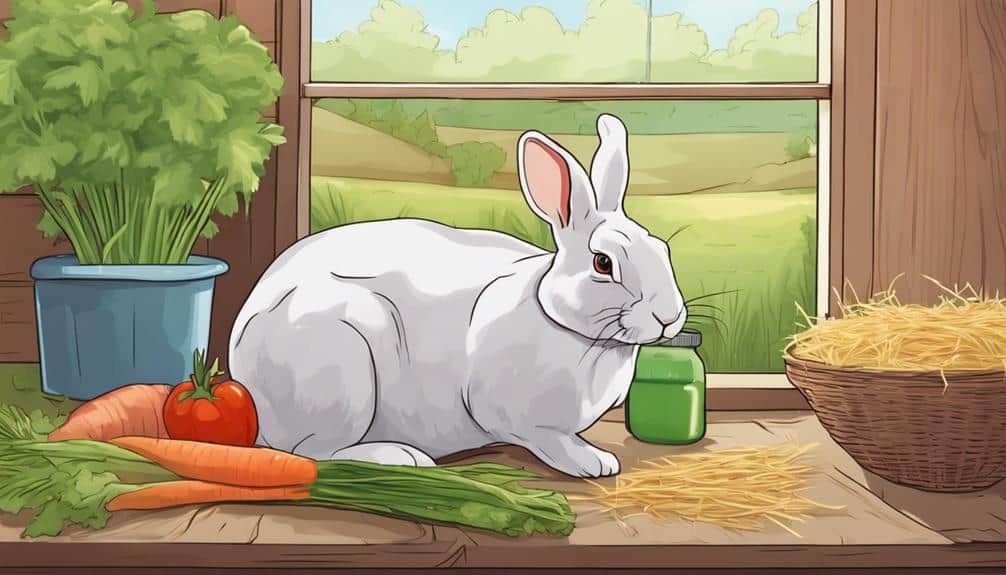
During a bunny's pregnancy, it's crucial to observe nesting behaviors closely, provide a balanced diet, and monitor their health with care.
Creating a quiet, clean nesting area can help your pregnant bunny feel safe and comfortable. Remember to offer fresh water and nutritious food while keeping an eye out for any changes in behavior or health.
Nesting Behavior Tips
For pregnant bunnies, creating a cozy nest with hay or straw is essential for ensuring a warm and comfortable birthing environment. Here are some tips to help you with nesting behavior:
- Provide Suitable Materials: Offer hay, straw, and soft bedding for your bunny to build a snug nest.
- Monitor Nesting Behavior: Watch for signs like fur pulling and digging to indicate that your bunny is preparing for birth.
- Set Up a Quiet Environment: Create a private space away from noise and disturbances where your pregnant bunny can feel safe and secure during the birthing process.
Dietary Needs During Pregnancy
To guarantee the health and well-being of your pregnant bunny, it's important to carefully consider their dietary needs during this critical time. Pregnant rabbits require a diet high in fiber to support digestion and prevent gastrointestinal issues. Make sure unlimited access to fresh hay to meet their fiber needs.
Supplement their diet with fresh vegetables and a small amount of pellets for balanced nutrition. Avoid sudden dietary changes to prevent digestive upset in pregnant bunnies.
Hydration is essential, so always provide clean, fresh water to keep your pregnant rabbit hydrated and support overall health. By maintaining a consistent and appropriate diet, you can help your bunny stay healthy throughout pregnancy.
Monitoring Health Closely
Keep a close eye on your pregnant bunny's health by monitoring her weight and watching for any signs of illness or discomfort. Here's how to guarantee the well-being of your expecting bunny:
- Monitor Weight: Check her weight regularly to make sure it remains stable, indicating a healthy pregnancy.
- Watch for Signs of Illness: Be alert for any unusual behavior or symptoms of illness, and promptly seek veterinary advice if needed.
- Guarantee Proper Nutrition: Keep track of her food and water intake to make sure she's receiving adequate nutrition for herself and her babies.
Bunny Labor and Delivery Process

During bunny labor, known as kindling, the process typically lasts 15-20 minutes. Rabbits usually choose to give birth during the night, seeking a sense of safety.
The birthing process for rabbits is swift, with an average litter size ranging from 3-12 kits. Remarkably, rabbits don't usually require assistance during delivery; they're instinctively equipped to manage it on their own.
Providing darkness during kindling time is essential, as it creates a natural environment where the mother rabbit can feel secure, birth her kits, and care for them.
Understanding these aspects of the labor and delivery process can help you support your pregnant rabbit and ensure a smooth and stress-free experience for both her and her newborns.
Nursing and Raising Bunny Kits
As your mother rabbit nurtures her newborn kits, she dutifully provides essential care and sustenance twice a day, ensuring their healthy development and well-being.
Here are some key points to keep in mind while nursing and raising bunny kits:
- Nursing Schedule: Mother rabbits nurse their kits at dawn and dusk, providing important nutrition for their growth and health.
- Dependence on Mother: Baby rabbits are born blind, deaf, and hairless, relying entirely on their mother for care and feeding, highlighting the importance of the mother's role in their early development.
- Development Milestones: Kits begin developing fur and opening their eyes around a week and a half after birth, showing signs of growth and progress under their mother's care.
Importance of Neutering Rabbits
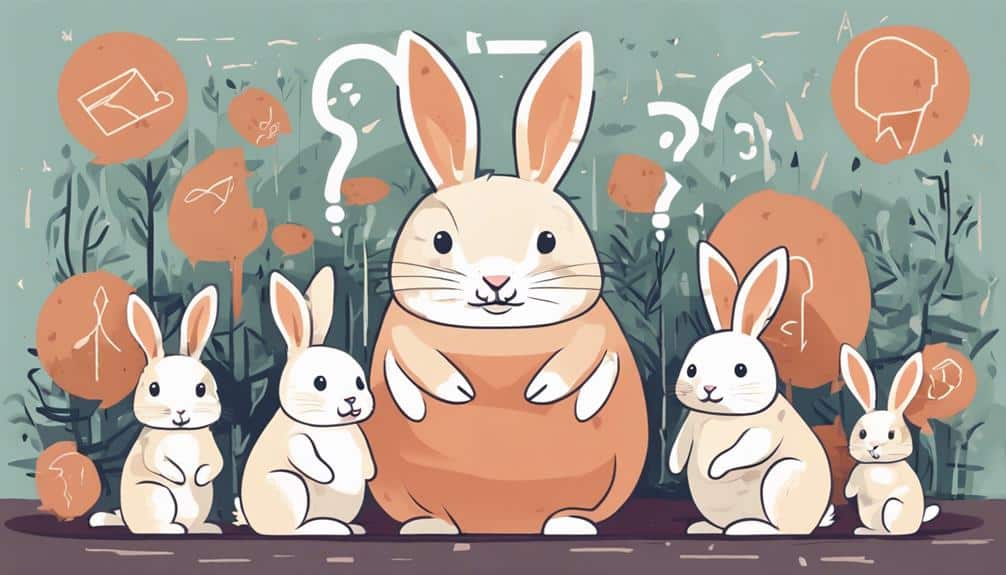
Neutering rabbits offers numerous benefits that contribute to their well-being and behavior. By neutering your pet rabbits, you can help reduce aggressive behavior and prevent them from spraying urine to mark territory. This procedure also plays a crucial role in controlling the rabbit population by avoiding unplanned litters and overpopulation issues.
Additionally, neutering can lower the risk of certain cancers, leading to a longer and healthier life for your beloved pets. Considering the many advantages it offers, neutering is a responsible choice that not only benefits individual rabbits but also contributes to the welfare of the rabbit community as a whole.
Frequently Asked Questions
What Is the Gestation Period of a Rabbit?
The gestation period of a rabbit is around 31 days, essential for preparing for the birth of kits. Monitor nesting behaviors, growth stages, ultrasound confirmation, dietary changes, vet check-ups, fetal development, exercise needs, and labor signs for a healthy delivery.
What Is the Timeline of Rabbit Pregnancy?
During a rabbit's pregnancy, you'll notice various growth stages, nesting behaviors, and signs of pregnancy. Maternal instincts will kick in, prompting dietary changes. Carefully monitor health, prepare the environment, and provide the best care possible.
How Soon Can You Tell if a Rabbit Is Pregnant?
You can typically tell if a rabbit is pregnant within 10-14 days post-mating through palpation, ultrasound, or hormone tests. Look for early signs like nesting behaviors, mood changes, swollen nipples, and increased appetite.
What Do Female Rabbits Do Before Giving Birth?
Before giving birth, female rabbits exhibit nesting behavior by preparing a cozy nest with hay or straw, pulling out fur for warmth, and showcasing protective actions. Seeking seclusion, they build nests, display restlessness, and reduce activity.
Conclusion
Congratulations on making it through the rabbit gestation period FAQs! You've learned how to spot signs of pregnancy, care for your pregnant bunny, manage labor and delivery, and raise healthy bunny kits.
Remember, the journey of rabbit reproduction may seem like a rollercoaster ride at times, but with dedication and love, you'll navigate it like a seasoned pro. Keep up the fantastic work, you're practically a bunny birthing expert now!


